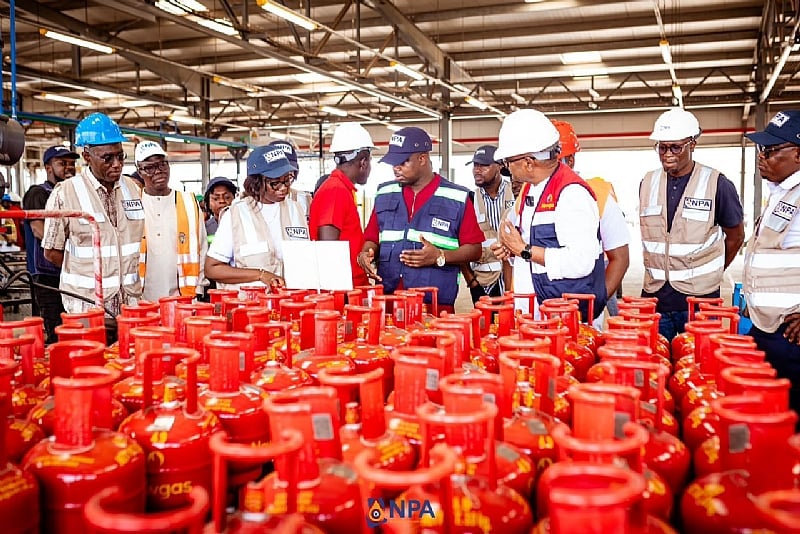The National Petroleum Authority (NPA) of Ghana, under the leadership of Chief Executive Godwin Kudzo Tameklo, has reiterated its commitment to streamlining the implementation of the Cylinder Recirculation Model (CRM) for Liquefied Petroleum Gas (LPG). This model, designed to enhance safety and efficiency in the LPG distribution chain, has encountered challenges since its inception. Mr. Tameklo, accompanied by his deputies Dr. Sheila Addo and Dr. Dramani Bukari, embarked on a tour of key LPG bottling plants in the Tema enclave, including Goil, New Gas, and Blue Ocean, to gain firsthand insight into the current operational landscape of the new distribution chain and to address concerns raised by industry stakeholders. The CEO emphasized the NPA’s dedication to fostering a conducive business environment while upholding stringent safety and regulatory standards. Recognizing the concerns of licensed operators, Mr. Tameklo assured them of the NPA’s commitment to tackling issues such as unauthorized door-to-door LPG delivery services that compromise established safety protocols.
The Cylinder Recirculation Model (CRM) represents a significant shift in Ghana’s LPG distribution system, aiming to move away from the traditional exchange system, where consumers exchange empty cylinders for filled ones at retail points, towards a system where consumers purchase or lease cylinders and refill them at designated points. This transition is intended to enhance safety by ensuring stricter control over cylinder quality and handling, while also improving efficiency and supply chain management. However, the implementation of the CRM has been fraught with challenges, including resistance from some segments of the industry and the public, logistical hurdles, and the emergence of unregulated actors exploiting the transition period. The NPA’s efforts to address these challenges are crucial for the successful implementation of the CRM and the realization of its anticipated benefits.
One of the key challenges identified by the bottling plant operators during the CEO’s visit is the proliferation of unlicensed companies offering door-to-door LPG delivery services. This practice not only undermines the established safety protocols for handling LPG, potentially increasing the risk of accidents, but also creates unfair competition for licensed operators who have invested in infrastructure and adhere to regulatory requirements. The unlicensed operators often bypass safety checks and training, posing a significant threat to public safety. Their activities also erode the market share of legitimate businesses and discourage investment in the formal LPG sector. Addressing this issue is crucial for ensuring a level playing field and promoting investor confidence in the industry.
The NPA’s commitment to supporting legitimate businesses while enforcing regulations is essential for fostering a thriving and safe LPG sector. The Authority recognizes that a robust regulatory framework is necessary to ensure the safety and efficiency of the LPG distribution chain. By upholding these standards and taking action against those who operate outside the legal framework, the NPA aims to create a level playing field for all stakeholders and protect consumers from potential risks. This commitment to regulatory enforcement is critical for building trust in the CRM and ensuring its long-term success.
The tour undertaken by the NPA CEO and his deputies serves as a demonstration of the Authority’s proactive approach to engaging with industry stakeholders and addressing the challenges facing the LPG sector. By directly interacting with bottling plant operators, the NPA leadership gains firsthand insights into the practical realities of the CRM implementation and can better tailor its interventions to the specific needs of the industry. This open dialogue and collaborative approach are crucial for building consensus and fostering a shared understanding of the challenges and opportunities presented by the CRM. The NPA’s commitment to transparent and inclusive engagement with stakeholders is vital for ensuring the successful implementation of the CRM and the development of a sustainable and safe LPG sector.
In conclusion, the NPA’s efforts to address the challenges of the CRM implementation, particularly the issue of unlicensed door-to-door LPG delivery services, underscore the Authority’s commitment to fostering a safe, efficient, and competitive LPG market in Ghana. By engaging directly with industry stakeholders, enforcing regulations, and promoting a level playing field, the NPA aims to ensure the successful implementation of the CRM and the realization of its intended benefits for both businesses and consumers. The focus on addressing safety concerns and supporting legitimate operators is essential for building trust in the new distribution model and driving long-term growth in the LPG sector. The NPA’s proactive approach and commitment to collaboration with stakeholders are crucial for achieving these objectives and fostering a sustainable and secure LPG landscape in the country.


